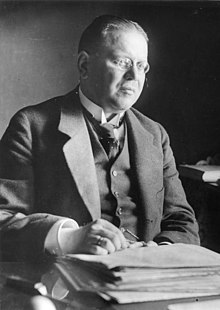Matthias Erzberger
| Matthias Erzberger | |
|---|---|

Erzberger in 1919
|
|
|
Vice-Chancellor of Germany |
|
|
In office 21 June 1919 – 3 October 1919 |
|
| President | Friedrich Ebert |
| Chancellor | Gustav Bauer |
| Preceded by | Bernhard Dernburg |
| Succeeded by | Eugen Schiffer |
| Reich Minister of Finance | |
|
In office 21 June 1919 – 12 March 1920 |
|
| President | Friedrich Ebert |
| Chancellor | Gustav Bauer |
| Preceded by | Bernhard Dernburg |
| Succeeded by | Joseph Wirth |
| Personal details | |
| Born |
20 September 1875 Buttenhausen, Württemberg, German Empire |
| Died | 26 August 1921 (aged 45) Bad Griesbach |
| Political party | Centre Party |
| Occupation | Politician |
Matthias Erzberger (20 September 1875 – 26 August 1921) was a German publicist and politician, Reich Minister of Finance from 1919 to 1920.
Prominent in the Catholic Centre Party, he spoke out against World War I from 1917 and as authorized representative of the Reich government signed the armistice between Germany and the Allies. He was assassinated for this act by the right-wing terrorist group Organisation Consul.
He was born on 20 September 1875 in Buttenhausen (today part of Münsingen) in the Kingdom of Württemberg, the son of Josef Erzberger (1847-1907), a tailor and postman, and his wife Katherina (née Flad; 1845-1916). In his early life he gained massive weight, which he lost in the course of thirty years. He attended the seminaries in Schwäbisch Hall and Bad Saulgau, where he graduated in 1894, and started a career as a primary school (Volksschule) teacher. While teaching, he also studied constitutional law and economics at Fribourg, Switzerland. Two years later, he became a journalist working for the Catholic Centre party's publication Deutsches Volksblatt in Stuttgart, where he also worked as a freelance writer. Erzberger joined the Catholic Centre Party and was first elected to the German Reichstag in 1903 for Biberach. By virtue of unusually varied political activities, he took a leading position in the parliamentary party. He became a specialist in colonial policy and financial policy, contributing to the financial reforms of 1909. In 1912, Erzberger became a member of the Fraktionsführung, the leadership of the parliamentary party. He supported a significant military build-up in Germany in the years 1912-13.
...
Wikipedia
